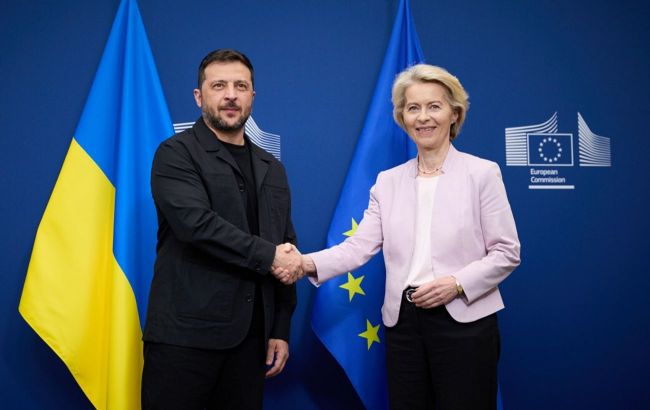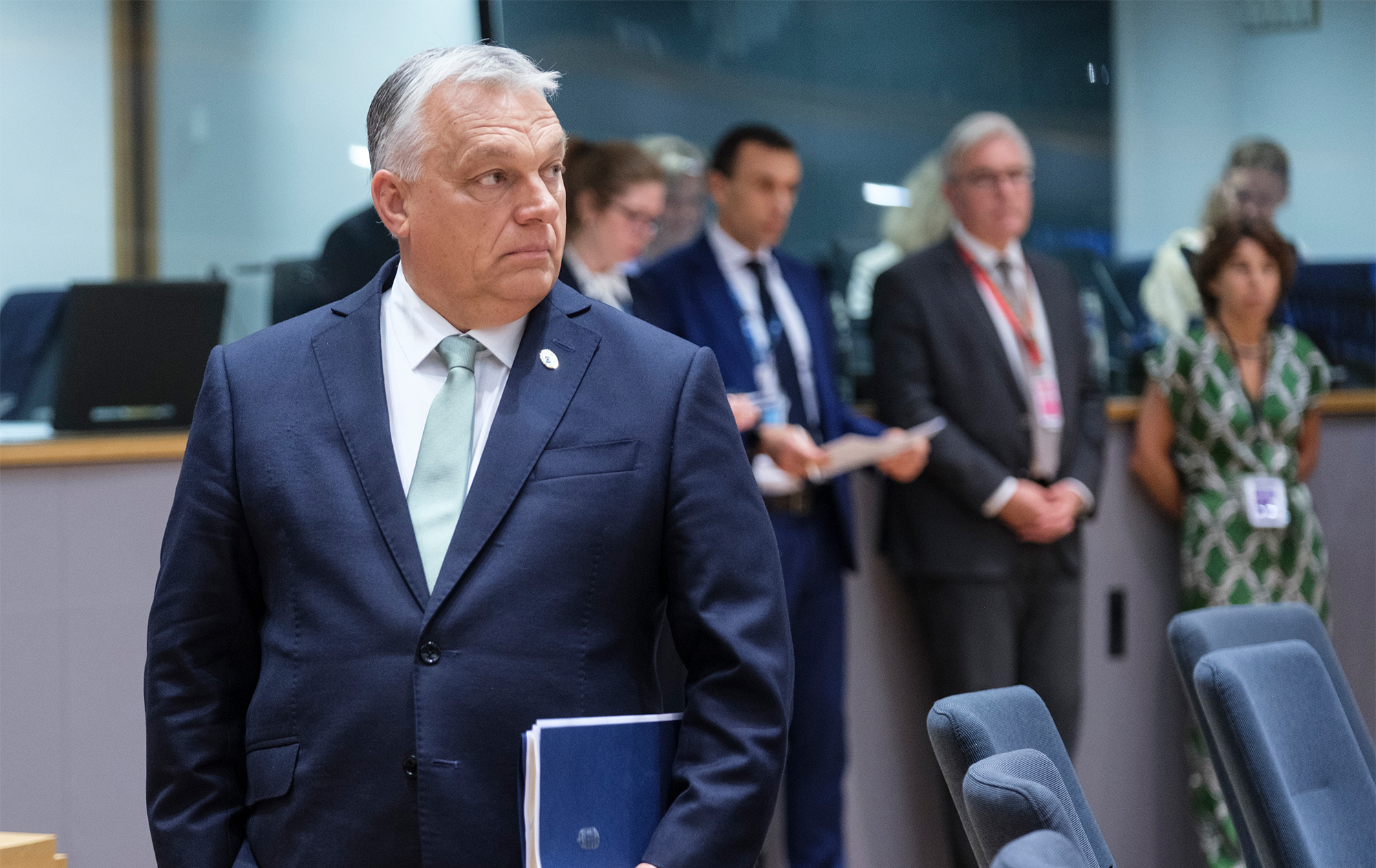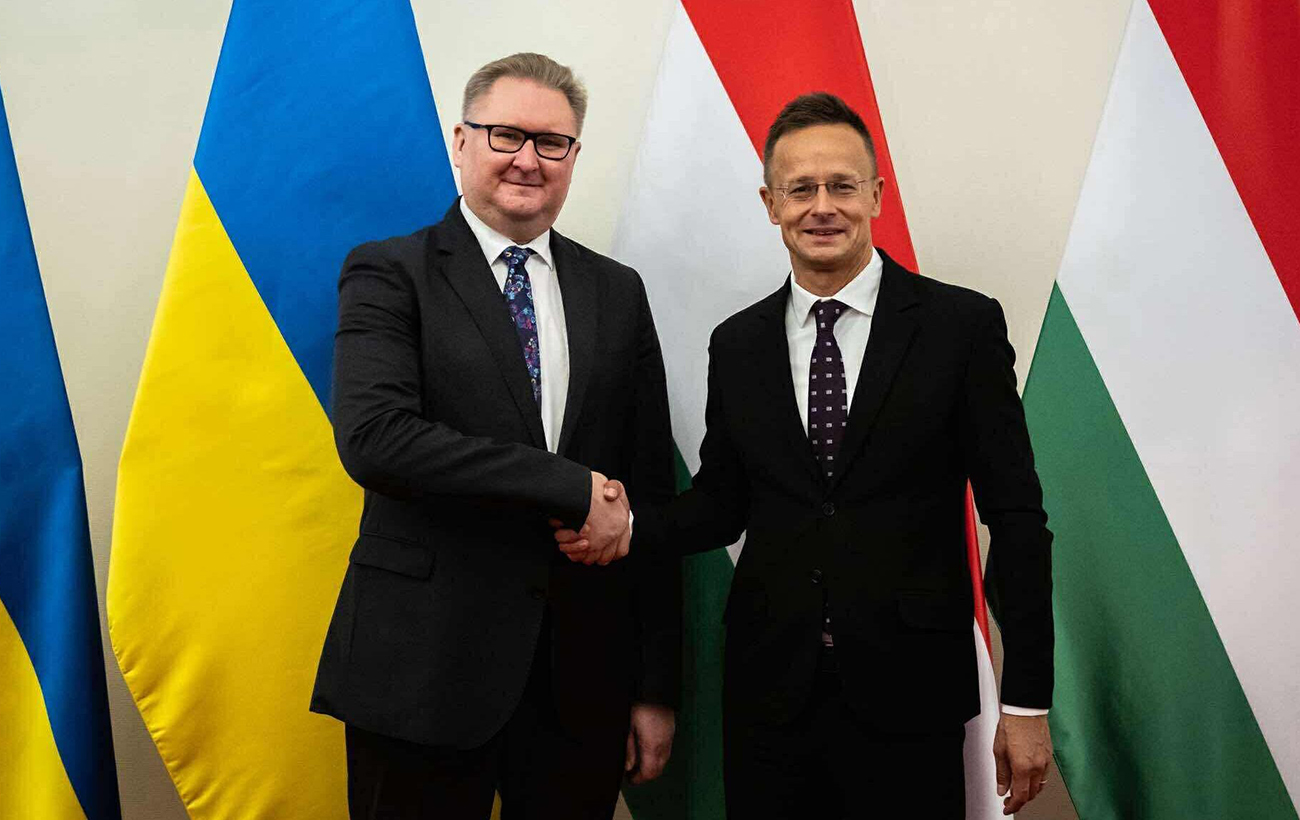Ukraine vs. Orbán and bureaucracy: Who's blocking Kyiv's path to European Union
 President of Ukraine Volodymyr Zelenskyy and President of the European Commission Ursula von der Leyen (photo: Getty Images)
President of Ukraine Volodymyr Zelenskyy and President of the European Commission Ursula von der Leyen (photo: Getty Images)
On its path to the European Union, Ukraine has encountered a major obstacle—a veto from Hungary. RBC-Ukraine analyzes what the options are for circumventing it, how they align with Ukrainian interests, and what stage of European integration Ukraine is currently at.
Key questions
- What are Brussels and Kyiv saying about Orbán's veto?
- Technical opening of negotiation clusters – what are the arguments for and against?
- What challenges await the new person responsible for European integration in Ukraine?
There is a lot of bureaucracy in the European Union. Sometimes it is useful – it acts as a safeguard against fools. But more often than not, it does more harm than good – especially when it comes to Ukraine's accession to the EU.
Kyiv has already passed three landmark votes on this path: obtaining candidate status, the official opening of negotiations, and the opening of the negotiating framework. Ukraine is still waiting for the fourth vote on the opening of the negotiating clusters.
In fact, the opening of clusters is the beginning of official negotiations on specific thematic blocks of EU legislation. There are six clusters in total: Fundamentals, Internal Market, Competitiveness and Inclusive Growth, Green Agenda and Sustainable Connectivity, Resources, Agriculture, and Cohesion, and External Relations.
Each cluster covers several chapters in which Ukraine harmonizes its legislation with EU standards. There are 35 such chapters in total. Once the laws have been brought into line with European standards, the clusters should be closed. And then all that remains is the EU's political decision on Ukraine's accession.
Veto problem
At least the first cluster was supposed to be opened in July. However, this has not yet happened due to Hungary's position. During this year, the country's Prime Minister Viktor Orbán has taken a particularly tough stance, primarily due to domestic political considerations. In next year's elections, he has designated Ukraine as the main external enemy against which he is rallying his own voters.
Brussels has been trying to do something about this for a long time. Thus, on the initiative of European Council President António Costa, it is proposed that the opening of clusters should not be unanimous, but by a qualified majority – at least 55% of member states (currently 15 out of 27), representing at least 65% of the EU population.
Costa tried to persuade EU leaders to accept the innovation during his recent tour of several countries and meetings on the sidelines of the UN General Assembly. And last week in Copenhagen, the leaders of all member states discussed this idea. However, no decision has been made yet. According to Politico, France, the Netherlands, and Greece, in addition to Hungary, have objections. Discussions are ongoing.
Although the rejection of the principle of unanimity came up on the agenda specifically in the context of Ukraine, the problem is broader. It is a very convenient tool for small EU countries to promote their interests alongside large powers such as Germany or Italy. In addition, it allows individual countries to restrict the accession process of their antagonists. For example, Greece can do this with Türkiye, Bulgaria with North Macedonia, and Croatia with Serbia.
Options for overcoming veto
Despite these difficulties, Kyiv is determined. This is not least due to the political dynamics within Hungary. In April next year, Orbán is highly likely to lose power—for the first time in many years, he has a rival with a realistic chance of winning, the leader of the Tisza party, Péter Magyar.
So, it would seem that all that is needed is to wait until April, without formally adopting a political decision to open negotiation clusters, and to deal with technical issues in the meantime. This option has its supporters both in Brussels and among countries that are traditionally considered Ukraine's advocates in the EU.
"We are strong supporters of the need, if it is impossible to actually get EU27 on board, then to find creative solutions which would allow Ukraine and all the member states, except maybe one, to progress with Ukraine’s accession negotiations," Inga Stanytė-Toločkienė, Lithuania's Ambassador to Ukraine, told RBC-Ukraine.
According to her, this will allow work to begin on all issues that may arise for EU member states in the context of negotiations and to carry out this work informally, if it is currently impossible to move forward formally.
 Viktor Orbán in the European Parliament (photo: Getty Images)
Viktor Orbán in the European Parliament (photo: Getty Images)
However, this approach poses additional challenges for Ukraine. First, despite problems at home, Orbán still has a very real chance of retaining power.
Second, the negotiations between Ukraine and the European Union will require decisions that are legally binding. This is especially true for those sections of the negotiations where compromises must be approved by a vote of all EU countries. For example, in the areas of economy and trade, Ukraine has a number of disagreements with its neighbors.
"Right now, the first cluster, Fundamentals, is half the battle. Then, when we move on to the Internal Market, where we need to agree on transition periods and other sectoral chapters, with whom will we be negotiating? All of this simply needs to be voted on. It has to be approved," said Liubov Akulenko, executive director of the Ukrainian Center for European Policy, to RBC-Ukraine.
In total, there will be about 70 such votes on the opening and closing of each of the 35 chapters within the clusters. So there is a risk that the negotiations themselves will drag on for a very long time due to the veto of one country or another. And not necessarily Hungary.
In fact, the European Union has trapped itself with this practice. Whatever the solution may be, it must be found by the end of the year, while Denmark still holds the presidency. Cyprus, which has completely different priorities, is next in line to lead the EU. In early September, the Ambassador of Cyprus to Ukraine, Michalis Firilas, noted that his country considers the principle of unanimity to be important.
Ambassador Firilas said this is one of the most important elements for continuing the political process in Europe, without wanting to hold anyone hostage. At the same time, these are certain mechanisms through which national interests can be expressed, he added.
Political will in Ukraine and EU
Despite problems with opening clusters, technical work on Ukraine's European integration continues in both Brussels and Kyiv. Last week, the screening of Ukrainian legislation for compliance with EU standards was completed.
As noted by Deputy Prime Minister for European and Euro-Atlantic Integration Taras Kachka, a total of 34 bilateral meetings were held, lasting a total of 66 days. Representatives of more than 70 Ukrainian authorities took part in them, ranging from the Verkhovna Rada and the Cabinet of Ministers to the judiciary and law enforcement agencies.
European Commissioner for Enlargement Marta Kos arrived in Kyiv for this purpose. According to her, the rapid completion of the screening is an achievement in itself.
"We completed this process in less than a year. This is faster than ever before," Kos said.
The report on the screening results is expected to be ready in November, but it is already clear where Ukraine has gaps and where there will be less work to do.
"In some areas, we have made good progress, while in others, we have made, as they say in the language used by the European Commission, very, very modest progress. The reasons vary, but the willingness of partners to help was clearly demonstrated by these screening sessions," Vadym Halaichuk, a member of parliament and deputy chairman of the parliamentary committee on European integration, told RBC-Ukraine.
According to him, this involves preparing a specific plan for each section on how to achieve legislative compliance in a particular area. In addition, the EU is willing to use various financial instruments to enable Ukrainian businesses and the state as a whole to continue the adaptation process. First and foremost, this could be the Instrument for Pre-Accession Assistance (IPA) for financing and technical support to Ukraine.
During the negotiations, it also became clear that very open communication is necessary so that the impression is not created again that Ukraine is refusing to fulfill its obligations and is looking for loopholes or special conditions for itself.
"This is not the case. There is a completely normal negotiation process on how we are progressing, where to get the funds to achieve this compliance (of legislation, ed.), and when we can realistically fulfill our obligations," Halaichuk emphasized.
At the same time, the EU still feels the aftertaste of the story with the National Anti-Corruption Bureau of Ukraine (NABU) and Specialized Anti-Corruption Prosecutor's Office (SAPO), and the first large-scale protests in Ukraine during Russia's full-scale invasion. It does not concern specific negotiations, but rather general changes in attitudes towards Ukraine. As the agency's interlocutors said immediately after the scandal, the process of Ukrainian reforms will be monitored much more closely.
 Marta Kos (center) and Volodymyr Zelenskyy in Kyiv (photo: Getty Images)
Marta Kos (center) and Volodymyr Zelenskyy in Kyiv (photo: Getty Images)
Speaking in Kyiv, European Commissioner Kos noted that Ukraine's military experience and technology make it indispensable to Europe. At the same time, she emphasized that Ukraine must not allow any regression in reforms, particularly anti-corruption reforms.
"This (Ukraine's military power – ed.) is the backdrop against which our enlargement policy is operating today. But that does not mean that we should be lenient on fundamental reforms and simply make Ukraine a member as quickly as possible. The rule of law, the fight against corruption, and strong democratic institutions guarantee a strong Ukraine," the European Commissioner said.
In the July story with NABU and SAPO, there were mistakes on both sides, emphasizes Lithuanian Ambassador Inga Stanytė-Toločkienė.
"When it comes to the EU, our expectations were not articulated well enough. And when it comes to Ukraine, also, most likely there was no expectation that people would stand strongly behind those institutions that represent this, apart from a very tangible value, but also a very symbolic value as symbols of post-Maidan anti-corruption architecture. I believe it is important right now not to commit any further mistakes on none of the side. If we are really serious about moving forward in a fast manner, then we have to perform and deliver 120%," she said in a comment to RBC-Ukraine.
Who is responsible for movement towards EU
All this means new challenges and a lot of work for the Ukrainian authorities. In general, the entire process of European integration is supervised by the relevant deputy prime minister. On July 17, Taras Kachka was appointed to this position instead of Olha Stefanishyna. This work is not new to him. Kachka was previously Deputy Minister of Economy – Trade Representative of Ukraine and was involved in the economic dimension of relations with the EU. In addition, the entire composition of the government was renewed.
In practice, this led to temporary personnel changes. The government approved the new composition of the Interdepartmental Working Group on Negotiations only last week.
At the same time, Kachka announced broad consultations with businesses on adapting legislation to take into account their position on adapting Ukrainian legislation to EU standards. According to him, this process is aimed at ensuring that the reforms are practically relevant to the needs of entrepreneurs operating in the domestic and European markets.
"Stefanyishyna was in an easy phase—preparing roadmaps and undergoing screenings. If the first cluster opens, Kachka will enter the phase of direct negotiations and legislation development. It is much more difficult to show any results here – you have to change the legislation and also communicate with businesses. And then you need to have votes in the Rada so that all this can be voted on," Liuubov Akulenko told the agency.
 Deputy Prime Minister Taras Kachka and Hungarian Foreign Minister Péter Szijjártó (photo: Getty Images)
Deputy Prime Minister Taras Kachka and Hungarian Foreign Minister Péter Szijjártó (photo: Getty Images)
As for the relevant committee of the Verkhovna Rada, there have been no serious disruptions in communication with the new deputy prime minister so far.
"One of the main points I would like to note is that we have not felt any interruption in this work. There has been a change in the team, but there is no need to give it any extra time. Everything is proceeding at the pace we have set, and even faster," Vadym Halaichuk told RBC-Ukraine.
Another thing is that it is becoming increasingly difficult to find votes in the chamber to pass laws. As RBC-Ukraine wrote, the mono-majority has long existed only formally on paper. Previously, deputies from Servant of the People consistently secured about 180 votes, but now their core has shrunk to 120-130 seats. The remaining 50-60 votes have to be collected manually each time. Although European integration laws are often supported by the opposition, this still adds political risks for the future.
According to Akulenko, some challenges will lie in involving other authorities. In particular, when it comes to the first cluster, Fundamentals. Within its framework, new changes must be made to the courts, anti-corruption bodies, security structures, borders, etc.
At the same time, the external challenge to Ukraine's European integration still looks more serious, although there are reasonable hopes that it will be overcome.
"Ukraine will be in the European Union with or without Orbán. Because this is the choice of the Ukrainian people," President Volodymyr Zelenskyy said on October 6.
***
Ukraine's path to the EU remains difficult due to bureaucracy, Hungary's veto, and internal political challenges, but Kyiv is demonstrating determination and progress in reforms. The completion of screening, the active work of the entire executive branch, and the support of the President and Ukraine's advocates in the EU provide grounds for optimism. However, in order to accelerate negotiations, it is necessary to overcome the principle of unanimity in the EU, involve business, and secure votes in the Rada — all of which are separate tasks with an asterisk.
Sources: Statements by Ukrainian and European politicians, comments by Lithuanian Ambassador to Ukraine Inga Stanytė-Toločkienė, Member of Parliament Vadym Halaichuk, Executive Director of the Ukrainian Center for European Policy Liubov Akulenko, Ambassador of Cyprus to Ukraine Michalis Firilas, Politico, Bloomberg, and Reuters.

